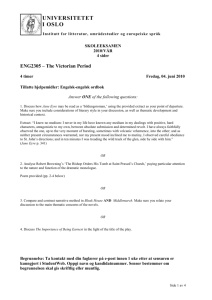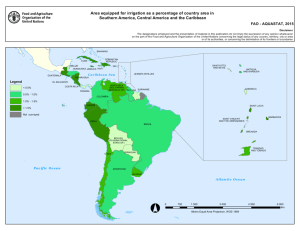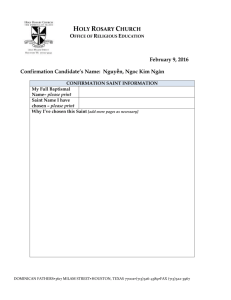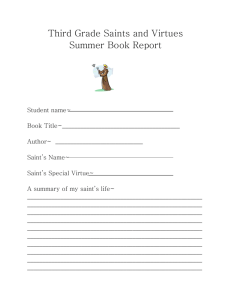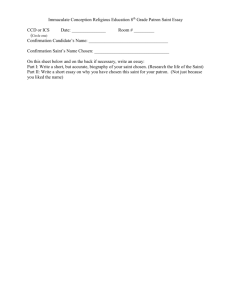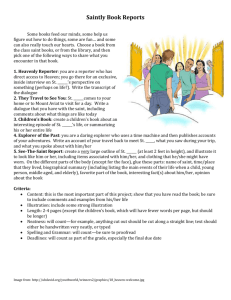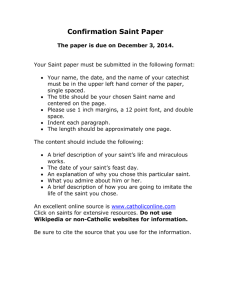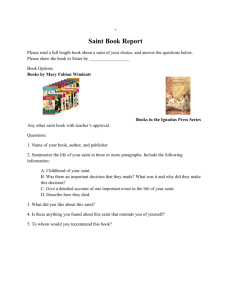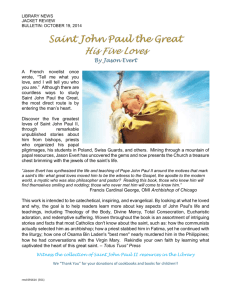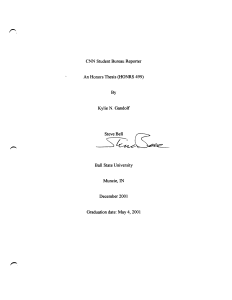My Last Duchess
advertisement
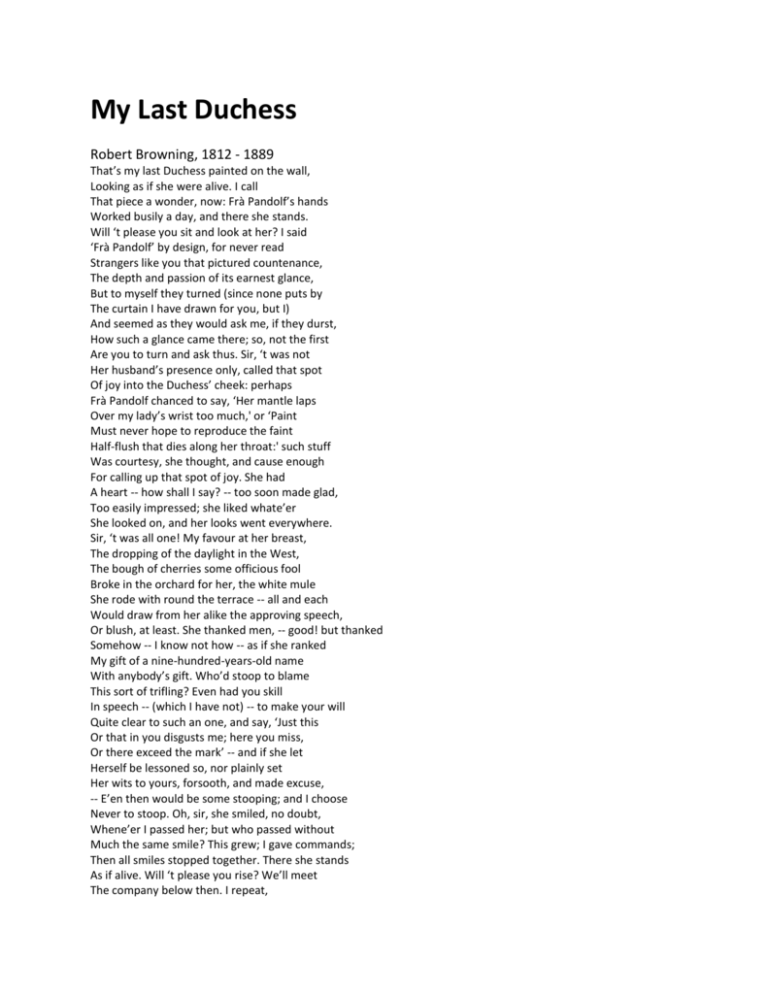
My Last Duchess Robert Browning, 1812 - 1889 That’s my last Duchess painted on the wall, Looking as if she were alive. I call That piece a wonder, now: Frà Pandolf’s hands Worked busily a day, and there she stands. Will ‘t please you sit and look at her? I said ‘Frà Pandolf’ by design, for never read Strangers like you that pictured countenance, The depth and passion of its earnest glance, But to myself they turned (since none puts by The curtain I have drawn for you, but I) And seemed as they would ask me, if they durst, How such a glance came there; so, not the first Are you to turn and ask thus. Sir, ‘t was not Her husband’s presence only, called that spot Of joy into the Duchess’ cheek: perhaps Frà Pandolf chanced to say, ‘Her mantle laps Over my lady’s wrist too much,' or ‘Paint Must never hope to reproduce the faint Half-flush that dies along her throat:' such stuff Was courtesy, she thought, and cause enough For calling up that spot of joy. She had A heart -- how shall I say? -- too soon made glad, Too easily impressed; she liked whate’er She looked on, and her looks went everywhere. Sir, ‘t was all one! My favour at her breast, The dropping of the daylight in the West, The bough of cherries some officious fool Broke in the orchard for her, the white mule She rode with round the terrace -- all and each Would draw from her alike the approving speech, Or blush, at least. She thanked men, -- good! but thanked Somehow -- I know not how -- as if she ranked My gift of a nine-hundred-years-old name With anybody’s gift. Who’d stoop to blame This sort of trifling? Even had you skill In speech -- (which I have not) -- to make your will Quite clear to such an one, and say, ‘Just this Or that in you disgusts me; here you miss, Or there exceed the mark’ -- and if she let Herself be lessoned so, nor plainly set Her wits to yours, forsooth, and made excuse, -- E’en then would be some stooping; and I choose Never to stoop. Oh, sir, she smiled, no doubt, Whene’er I passed her; but who passed without Much the same smile? This grew; I gave commands; Then all smiles stopped together. There she stands As if alive. Will ‘t please you rise? We’ll meet The company below then. I repeat, 2 The Count your master’s known munificence Is ample warrant that no just pretence Of mine for dowry will be disallowed; Though his fair daughter’s self, as I avowed At starting, is my object. Nay, we’ll go Together down, sir. Notice Neptune, though, Taming a sea-horse, thought a rarity, Which Claus of Innsbruck cast in bronze for me! 3 “The Bishop Orders his Tomb at St. Praxed’s Church” Robert Browning, 1812 - 1889 Vanity, saith the preacher, vanity! Draw round my bed: is Anselm keeping back? Nephews — sons mine . . . ah God, I know not! Well — She, men would have to be your mother once, Old Gandolf envied me, so fair she was! What’s done is done, and she is dead beside, Dead long ago, and I am Bishop since, And as she died so must we die ourselves, And thence ye may perceive the world’s a dream. Life, how and what is it? As here I lie 10 In this state-chamber, dying by degrees, Hours and long hours in the dead night, I ask “Do I live, am I dead?” Peace, peace seems all. Saint Praxed’s ever was the church for peace; And so, about this tomb of mine. I fought With tooth and nail to save my niche, ye know: — Old Gandolf cozened me, despite my care; Shrewd was that snatch from out the corner South He graced his carrion with. God curse the same! Yet still my niche is not so cramped but thence 20 One sees the pulpit o’ the epistle-side, And somewhat of the choir, those silent seats, And up into the aery dome where live The angels, and a sunbeam’s sure to lurk; And I shall fill my slab of basalt there, And ‘neath my tabernacle take my rest, With those nine columns round me, two and two, The odd one at my feet where Anselm stands: Peach-blossom marble all, the rare, the ripe As fresh-poured red wine of a mighty pulse. 30 — Old Gandolf with his paltry onion-stone, Put me where I may look at him! True peach, Rosy and flawless: how I earned the prize! Draw close: that conflagration of my church — What then? So much was saved if aught were missed! My sons, ye would not be my death? Go dig The white-grape vineyard where the oil-press stood, Drop water gently till the surface sink, And if ye find . . . Ah God, I know not, I! . . . Bedded in store of rotten fig-leaves soft, 40 And corded up in a tight olive-frail, Some lump, ah God, of , Big as a Jew’s head cut off at the nape, Blue as a vein o’er the Madonna’s breast . . . Sons, all have I bequeathed you, villas, all, That brave Frascati villa with its bath, So, let the blue lump poise between my knees, Like God the Father’s globe on both his hands Ye worship in the Jesu Church so gay, For Gandolf shall not choose but see and burst! 50 Swift as a weaver’s shuttle fleet our years: Man goeth to the grave, and where is he? Did I say basalt for my slab, sons? Black — ‘T was ever antique-black I meant! How else Shall ye contrast my frieze to come beneath? The bas-relief in bronze ye promised me, Those Pans and Nymphs ye wot of, and perchance Some tripod, thyrsus, with a vase or so, The Saviour at his sermon on the mount, Saint Praxed in a glory, and one Pan 60 Ready to twitch the Nymph’s last garment off, And Moses with the tables . . . but I know Ye mark me not! What do they whisper thee, Child of my bowels, Anselm? Ah, ye hope To revel down my villas while I gasp Bricked o’er with beggar’s mouldy travertine Which Gandolf from his tomb-top chuckles at! Nay, boys, ye love me — all of jasper, then! ‘T is jasper ye stand pledged to, lest I grieve. My bath must needs be left behind, alas! 70 One block, pure green as a pistachio-nut, There’s plenty jasper somewhere in the world — And have I not Saint Praxed’s ear to pray Horses for ye, and brown Greek manuscripts, And mistresses with great smooth marbly limbs? — That’s if ye carve my epitaph aright, Choice Latin, picked phrase, Tully’s every word, No gaudy ware like Gandolf’s second line — Tully, my masters? Ulpian serves his need! And then how I shall lie through centuries, 80 And hear the blessed mutter of the mass, And see God made and eaten all day long, And feel the steady candle-flame, and taste Good strong thick stupefying incense-smoke! For as I lie here, hours of the dead night, Dying in state and by such slow degrees, I fold my arms as if they clasped a crook, And stretch my feet forth straight as stone can point, And let the bedclothes, for a mortcloth, drop Into great laps and folds of sculptor’s-work: 90 And as yon tapers dwindle, and strange thoughts Grow, with a certain humming in my ears, 4 About the life before I lived this life, And this life too, popes, cardinals and priests, Saint Praxed at his sermon on the mount, Your tall pale mother with her talking eyes, And new-found agate urns as fresh as day, And marble’s language, Latin pure, discreet, — Aha, ELUCESCEBAT quoth our friend? No Tully, said I, Ulpian at the best! 100 Evil and brief hath been my pilgrimage. All lapis, all, sons! Else I give the Pope My villas! Will ye ever eat my heart? Ever your eyes were as a lizard’s quick, They glitter like your mother’s for my soul, Or ye would heighten my impoverished frieze, Piece out its starved design, and fill my vase With grapes, and add a vizor and a Term, And to the tripod ye would tie a lynx That in his struggle throws the thyrsus down, 110 To comfort me on my entablature Whereon I am to lie till I must ask “Do I live, am I dead?” There, leave me, there! For ye have stabbed me with ingratitude To death — ye wish it — God, ye wish it! Stone — Gritstone, a-crumble! Clammy squares which sweat As if the corpse they keep were oozing through — And no more lapis to delight the world! Well go! I bless ye. Fewer tapers there, But in a row: and, going, turn your backs 120 — Ay, like departing altar-ministrants, And leave me in my church, the church for peace, That I may watch at leisure if he leers — Old Gandolf, at me, from his onion-stone, As still he envied me, so fair she was! NOTES: 1. Vanity, saith the preacher: Ecclesiastes 1.2. 21. Epistle-side: the right-hand side facing the altar, where the epistle is read by the priest acting as celebrant, the gospel being read from the other side by the priest acting as assistant. 25. Basalt: trap-rock, leaden or black in color. 31. Onion stone: for the Italian , a kind of greenish-white marble splitting into coats like an onion, ; hence so called. 41. Olive-frail: a basket made of rushes, used for packing olives. 42. Lapis lazuli: a bright blue stone. 46. Frascati: near Rome, on the Alban hills. 48. God the Father’s globe: in the group of the Trinity adorning the altar of Saint Ignatius at the church of Il Gesu in Rome. 51. Weaver’s shuttle: Job 7.6. 54. Antique-black: Nero antico. Browning gives the English equivalent for the name of this stone. 58. Tripod: the seat with three feet on which the priestess of Apollo sat to prophesy, an emblem of the Delphic oracle. Thyrsus: the ivy-coiled staffer spear stuck in a pine-cone, symbol of Bacchic orgy. These, with the other Pagan tokens and pictures, mingle oddly but significantly with the references to the Saviour, Saint Praxed, and Moses. See also line 92, where Saint Praxed is confused with the Saviour, in the mind of the dying priest. Saint Praxed, the virgin daughter of a Roman Senator and friend of Saint Paul, in whose honor the Bishop’s Church is named, is again brought forward in lines 73-75 in a queer capacity which pointedly illustrates the speaker and his time. 66. Travertine: see note “Pictor Ignotus,” 67. 68. jasper: a dark green stone with blood-red spots, susceptible of high polish. 77. Tully’s: Marcus Tullius Cicero (106-46 B. C.). 79. Ulpian: a Roman jurist (170-228 A. D.), belonging to the degenerate age of Roman literature. 99. Elucescebat: he was illustrious; formed from elucesco, an inceptive verb from eluceo: in post classic Latin. 102. Else I give the Pope my villas: perhaps a threat founded on the custom of Julius II and other popes, according to Burckhardt, of enlarging their power “by making themselves heirs of the cardinals and clergy . . . Hence the splendor of tile tombs of the prelates . . . a part of the plunder being in this way saved from the hands of the Pope.” 108. A vizor and a Term: a mask, and a bust springing from a square pillar, representing the Roman god Terminus, who presided over boundaries. Source: http://www.victorianweb.org/authors/rb/bishop/text.html
